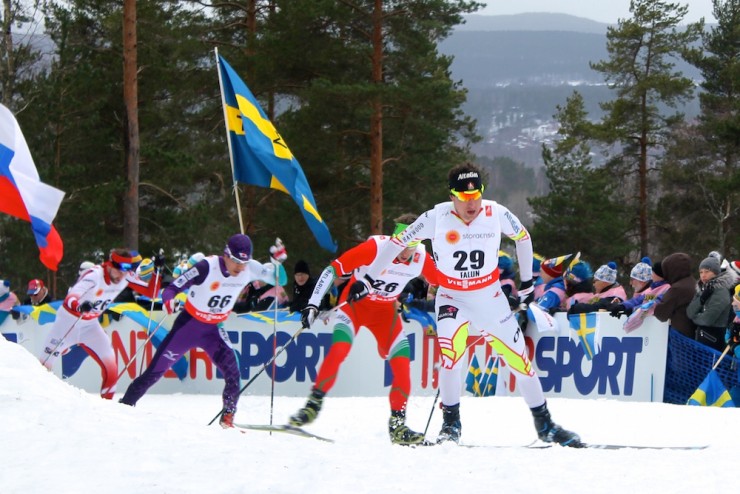
FasterSkier’s coverage of the 2015 FIS Nordic World Ski Championships in Falun, Sweden, is brought to you by the generous support of L.L. Bean, now featuring a complete line of Kikkan Randall training wear.
FALUN, Sweden — It only took a kilometer or so for Ivan Babikov to realize that he needed to go much, much faster. Two years ago at World Championships, the Canadian World Cup Team member placed fourth in the 15-kilometer freestyle individual start. In Falun on Wednesday, he was practically in last place for the first few thousand meters of the same race.
“The gaps right away were shocking,” Babikov recalled after the 15 k freestyle at 2015 FIS Nordic World Ski Championships. “I couldn’t believe it, like, ‘What the hell? I’m not skiing that slow. What’s going on?’ ”
That moment gave him the kick he needed to get going, but yet throughout the first of two 7.5 k laps, he struggled to find a consistent pace.
Fortunately for him, that was the worst of it.
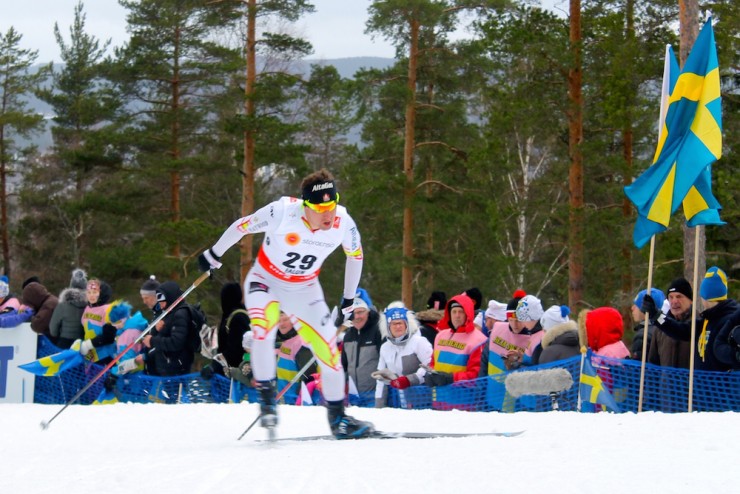
“The worst was the first two splits, after that I couldn’t hear too much at the end of the course [in the stadium],” he said. “Then, second lap, I felt like i was picking it up.”
Babikov, 34, went from ranking 70th of 86 men at 1.5 k to 45th at the halfway point. After starting 29th, he sped up considerably on his second lap, clocking the eventual 23rd- and 21st-fastest times at 11.4 k and 12.8 k, respectively.
He finished 20th, 1:45.4 minutes behind Sweden’s Johan Olsson, who won the race by 17.8 seconds on home soil in 35:01.6. Considering it was a ways off from his fourth place at the last World Championships, Babikov had mixed feelings about his result.
“My pacing was really weird — I don’t know how to feel about it,” Babikov said, noting that his second lap ended up being 24 seconds faster than his first.
“I don’t know how that’s possible,” he added. “I kind of had in my head that the second lap will be really important so maybe that made me go too slow in the first lap, but it didn’t feel like it. … I kind of turned it around and had an amazing second lap. It’s hard to wrap my head around what happened, today was so weird.”
While he explained that skis made a “huge difference” in the slushy snow on the 5-degree Celsius overcast afternoon, with sprinkles of rain toward the end of the race, he added that his team’s skis were on par with most other nations’. At the same time, a few teams had “rockets” despite the variable conditions, he observed.
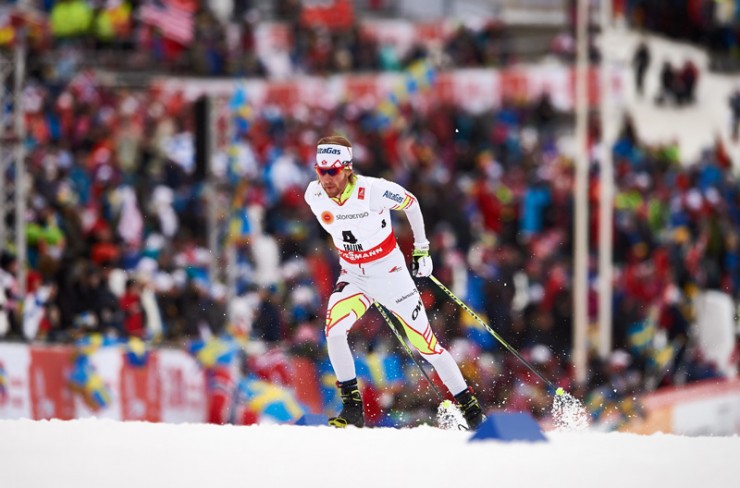
“I would say 70 percent of the course was just mush,” Babikov said. “Some of the steep uphills were ankle-deep slush.”
Throughout the race, he was unable to take full advantage of his strength in climbing. Most of the course was one-skate (V2), with the exception of the long, grinding uphill known as Mördarbacken. Babikov said only a minute or two of the 7.5 k loop, the steepest part of it, required offset (V1).
“I felt good on Mördarbacken, so climbing was not problem,” he said. “When I went to the second lap, I realized I still have a lot of energy so I started pushing all out…
“Top 20 sounds nice, but when you think about my fourth place, which came really surprisingly two years ago, it’s not even close,” he added. “Considering everything, I would probably be OK [with today’s result].”
By everything, Babikov meant the nasty cold, “some kind of viral thing,” he came down with a month ago in Rybinsk, Russia. After that World Cup, he flew home to Canada and spent the better part of the next week there down and out. When he returned to Östersund, Sweden, for the last World Cup before World Championships, Babikov placed 49th in the 15 k freestyle.
“I didn’t really know what to expect,” he said of Wednesday’s race, his season-long focus. “I had some good skating in the skiathlon a few days ago and that kind of gave me a piece of my mind. Every day is different so I tried to give 100 percent.
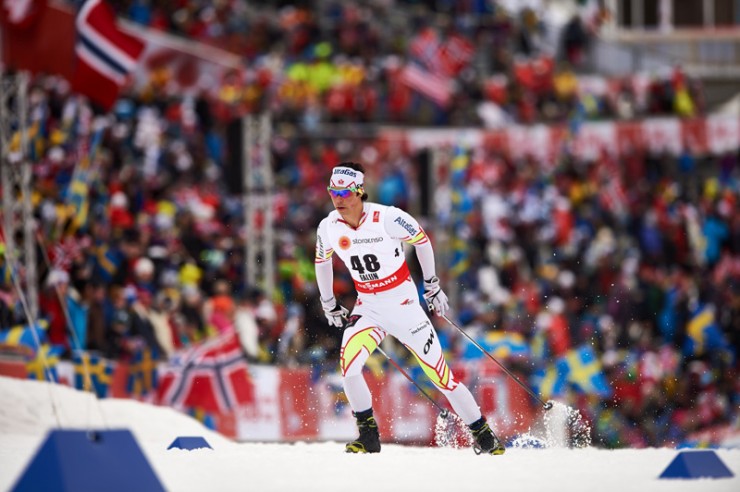
“Going into the relay, I think it’s a good sign,” he added of Friday’s 4 x 10 k team event. “I’m more positive about [today’s] race than bummed out.”
The second-fastest Canadian on Wednesday, Graeme Killick placed 32nd in his World Championships debut, 2:26.7 back from Olsson. The result stood as a career best at the World Cup level (excluding Olympics) after placing 39th in a World Cup 15 k classic last season in Toblach, Italy.
At the 2014 Olympics, Killick went on to place 28th in the 50 k freestyle mass start. Also in Sochi, Russia, he finished 44th in the 30 k skiathlon and 65th in the 15 k classic.
Recently, the 25-year-old Canadian National Development B-Team skier hadn’t raced since Rybinsk on Jan. 23 and 25, where he was 43rd in the 15 k freestyle and 40th in the skiathlon. Sick for the beginning of World Championships, he didn’t arrive in Falun until Sunday (Killick, Devon Kershaw, Emily Nishikawa, and Olivia Bouffard-Nesbitt stayed back in Östersund to recover from their illnesses for the first few days of worlds).
On Wednesday, Killick said he had been feeling well for the last three days.
“Skate really isn’t my strength so I think I didn’t quite blow up like I normally would on a course like this, so I think it was OK,” he said of his 15 k. “Good lead-up into the 50 [k classic mass start on Sunday] and just good to get a hard effort in after missing the [skiathlon].”
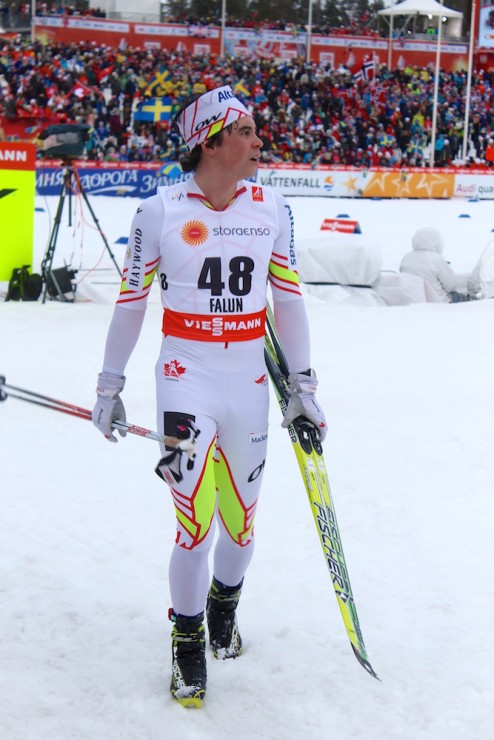
His teammate on the Alberta World Cup Academy (AWCA) and national-development team, Jess Cockney raced his first distance event since Dec. 7, when he was 67th in the World Cup 15 k classic pursuit in Lillehammer, Norway.
With fellow Canadians Alex Harvey preparing for other races (the relay and 50 k) and Kershaw also saving his energy for the final races of World Championships, Cockney asked his coaches if he could enter the 15 k skate and considered it a bonus.
“I just wanted to see if I could be consistent and have some of the hard training show itself in a result today,” Cockney said after placing 57th (+4:14.5). “I don’t think it really did, but it’s still good to be skiing distance races again. … I’ve just gotta work on fitness.”
Reflecting on his first World Championships, where he raced the classic sprint (49th), team sprint (13th) and 15 k skate, the 25-year-old Cockney said he’s learned a lot.
“I think I’m still not totally there mentally for the big races,” he said. “I kind of psyche myself out still a bit. I did at the Olympics last year and I did last week for the sprints so [I need to] just work on a little bit of mental training because we do enough stuff physically that my brain’s gotta be there, too.”
Alex Kochon
Alex Kochon (alexkochon@gmail.com) is a former FasterSkier editor and roving reporter who never really lost touch with the nordic scene. A freelance writer, editor, and outdoor-loving mom of two, she lives in northeastern New York and enjoys adventuring in the Adirondacks. She shares her passion for sports and recreation as the co-founder of "Ride On! Mountain Bike Trail Guide" and a sales and content contributor at Curated.com. When she's not skiing or chasing her kids around, Alex assists authors as a production and marketing coordinator for iPub Global Connection.



